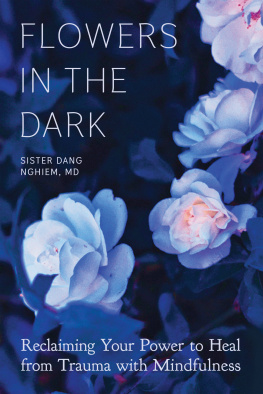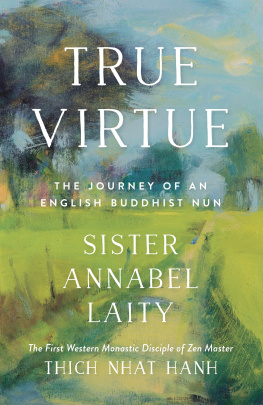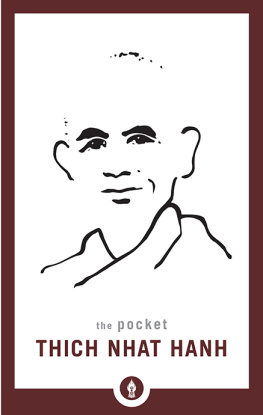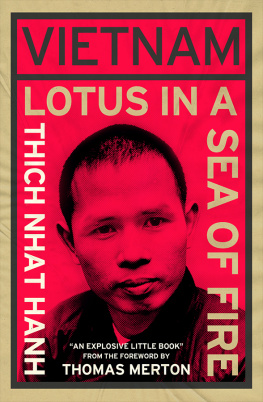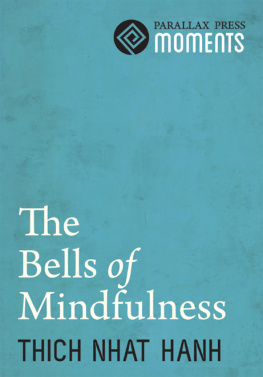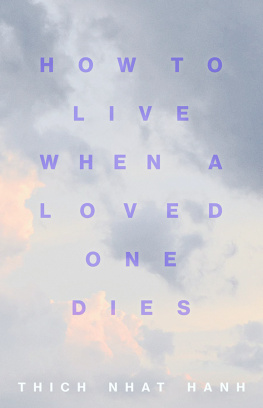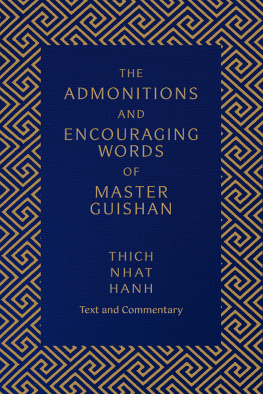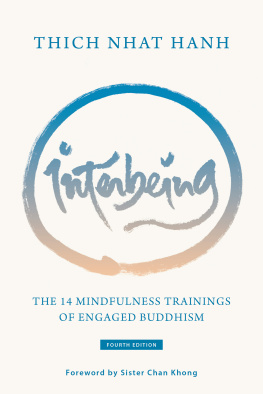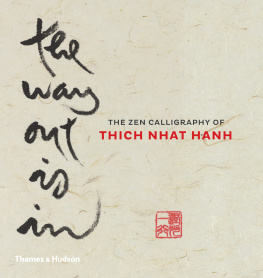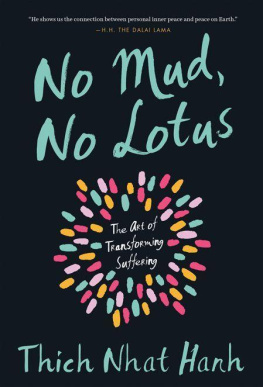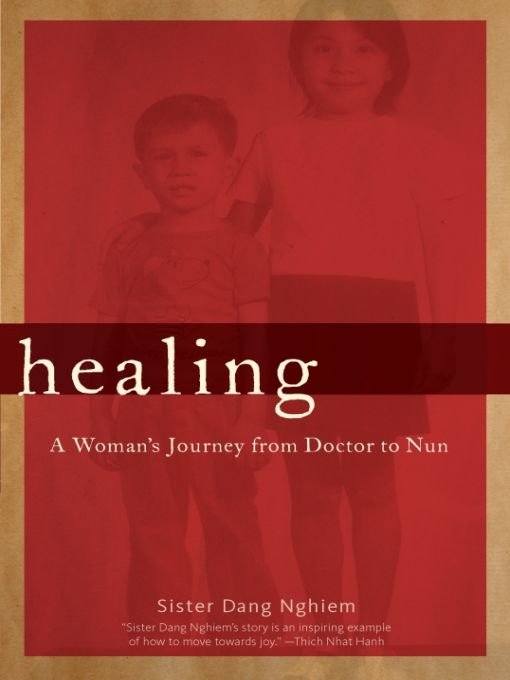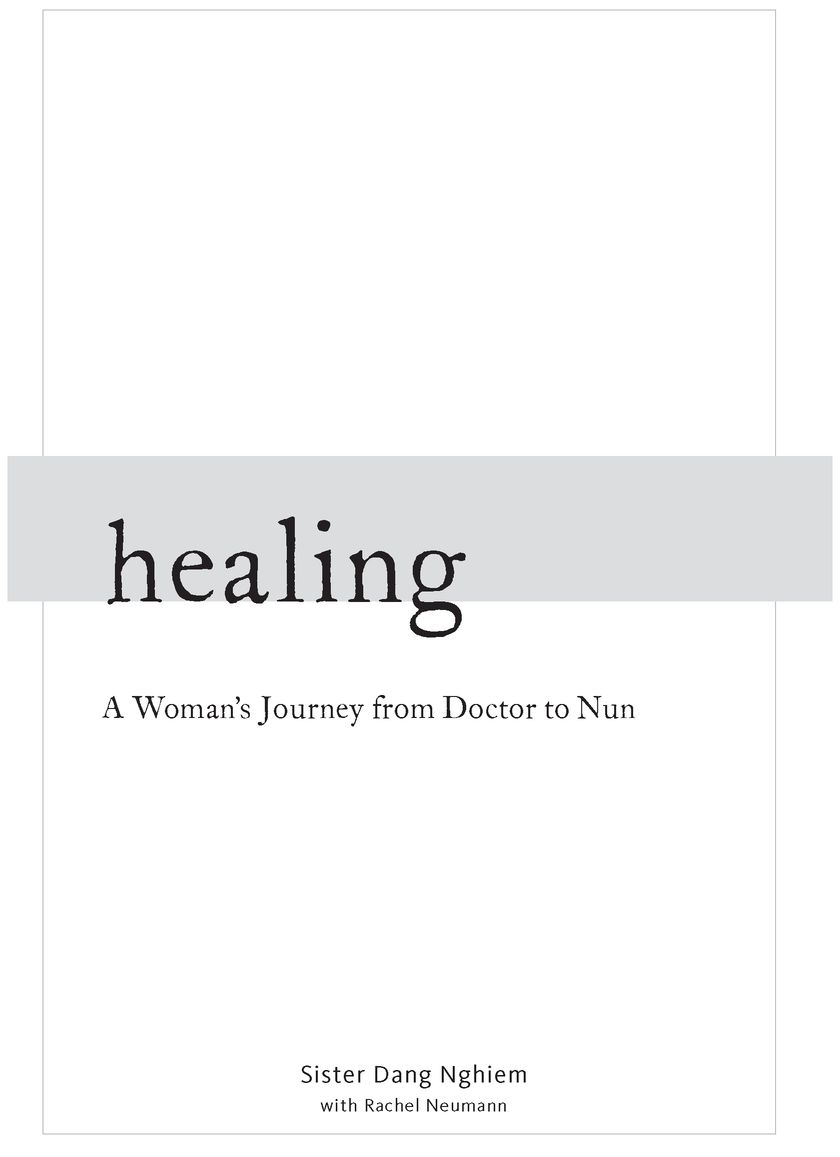Table of Contents
In gratitude to Thay, my grandmother,
Patrick, John, and my brother.
SISTER DANG NGHIEM
Introduction
the tears i shed have become rain
MY NAME IS SISTER DANG NGHIEM. Dang Nghiem is Vietnamese for Adornment with Nondiscrimination. My teacher, Thich Nhat Hanh (called Thay by his students), gave me that name when I ordained as a Buddhist nun in May 2000. When I received the name, I knew that nondiscrimination would be my lifelong practice.
I discover my name as I practice it. For me, nondiscrimination means to let go of the separation inside me, the idea that I am this and I am not that. It also means to let go of the discrimination that you are different from me and you will not understand me because of our different life experiences. This kind of discrimination brought me a lot of suffering and kept me feeling alienated and misunderstood. When I practice nondiscrimination, I gradually let go of that separation inside me and around me.
I was born in Vietnam in 1968, during the Vietnam War. My grandmother told me that I was born with three distinctive clumps of black hair on my head, which was bald otherwise. She said that I looked like a little monk, and that I was actually the daughter of the Bodhisattva Avalokiteshvara, the goddess of compassion. According to my grandmother, my mother was terrified and ashamed when she got pregnant, because my father might have been an older American soldier. As a result, my mother prayed day and night to Avalokiteshvara that I would look like her and not like the American man. Instead of being ashamed of having a mixed blood granddaughter who was born out of wedlock, my grandmother made me feel that I was special. She frequently took me to the temple and instructed me not to walk under clotheslines or crawl under beds or any dirty places, because my head belonged to the Mother Avalokiteshvara.
Before I left to go to the United States with my younger brother, my grandmothers only requests were that I raise my brother properly, that I obtain a high level of education, and that I become a nun afterward. Grandmother believed that being a nun was the ideal way for me to serve humanity.
Faithfully, I carried out my grandmothers requests, except for the last one. I could not fathom the idea of becoming a nun. I earned two college degrees. I graduated from a prestigious medical school. I traveled to recite my own poetry. I had a loving and supportive partner. I had everything Id ever wished for. Yet an undercurrent of melancholy and depression continued to affect my moods, behaviors, and outlook on life. Nightmares of incest continued to haunt me. The rare fights I had with my partner were always over movies that contained violence, physical abuse, and sexual abuse. I was unreasonable and righteous when it came to these issues, and no matter how sensitive and patient my partner was, I would lash out at him in anger. I blamed him for not understanding my pain. I crawled into my own darkness. I would crawl back out eventually, but the chasm between us continued to deepen. I loved my partner sincerely. Still, I was unable to stop the continual damage and suffering generated by my own thoughts, actions, and speech.
When my partner drowned, I saw emptiness in everything. I had worked so hard to become somebody special. I had thought that love from my partner would compensate for all that I had lost. I saw my own delusions and follies. Suddenly, everything lost its color and allure. In that emptiness, there was lightness too. I wanted nothing but peace. I desired nothing but to let go. The choices were obvious: to commit suicide or to change my life completely.
Chapter One
vietnam
I WAS BORN DURING THE WAR and I am a product of the war. I was born in Central Vietnam in 1968 during the Tet Offensive. At the time, the war was going on very forcefully, and there was heavy bombing in our area. As soon as I was born, bombs dropped on our village destroying our home. We had to run through tunnels and hide. My auntie carried me, and two men carried my mother in a hammock. They kept me and my mother on separate hammocks at a distance from each other, because they thought if they put the two of us together, we could both die. They carried us a long way, because no one in the adjacent village wanted to house us. Our neighbors believed that a woman who had just given birth had very negative energy and brought extremely bad luck to the host. In the end, a cousin of my mother agreed to accept us into his home.
My mother was Vietnamese, and she thought my father was an American soldier. I never knew for sure if my father was white or Vietnamese. I look very much like my mother. Once, I tried to ask my mother about my father, but she told me, He is dead. You are just a child. Dont ask too much. My brother, Son Huynh, called Sonny, was born with blond hair and Caucasian features.
My mother came from a poor family in the arid province of Quang Ngai. At fifteen she went alone to the big city of Saigon to look for work in order to help her mother feed the rest of her family. Because my mother was not educated, she first worked as a servant. Each night, the man she worked for would come to her little corner at the back of the house where she slept. She would curl up under her bamboo bed, but he would not let her be. He used a broom to poke her and get her out from under the bed. Broken in body and spirit, she wandered the streets. Her education was minimal, she had no skills, and so she ended up sleeping with American soldiers. What else could a poor and uneducated girl do? What could all the peasant girls do in the city in the midst of a ravaging war? No war promotes honest living. Thay said to me, What happened to your mother also happened to the whole country.
Soon after moving in with an older American soldier, my mother discovered she was pregnant with me and became very frightened. She took his radio and disappeared. Every night, my mother would pray to the Bodhisattva Avalokiteshvara that I would look like her and not like that American man. When I was born, my mother felt that her prayer had been answered. She named me Huynh Thi Ngoc Huong. Immediately, she handed me off to my grandmother in the countryside, who looked at the three distinctive clumps of black hair on my head and decided that I should become a nun. Throughout her life, she would remind me of her decision. When you grow up, you should become a monastic, my grandmother would conclude every time she looked at me. Then you can transcend your suffering and help others to do the same.
My mother was pregnant with my brother in 1972. After he was born, with his light hair and fair skin, he was also sent to live with my grandmother in the country. My mother stayed in Saigon and sent money to the family. I played with my cousins there, and I was free to roam around. My brother was just a little baby lying in a hammock. One time our cousin, Anh Ty, hung a gigantic cicada on a string hooked between the two ends of the hammock. Each time he pushed the hammock, the wind caused the cicada to spread its wings, and the buzzing sounds made my brother laugh joyfully. We lived in the rice fields of the countryside with my grandmother until I was six. This was the best time of my life.


